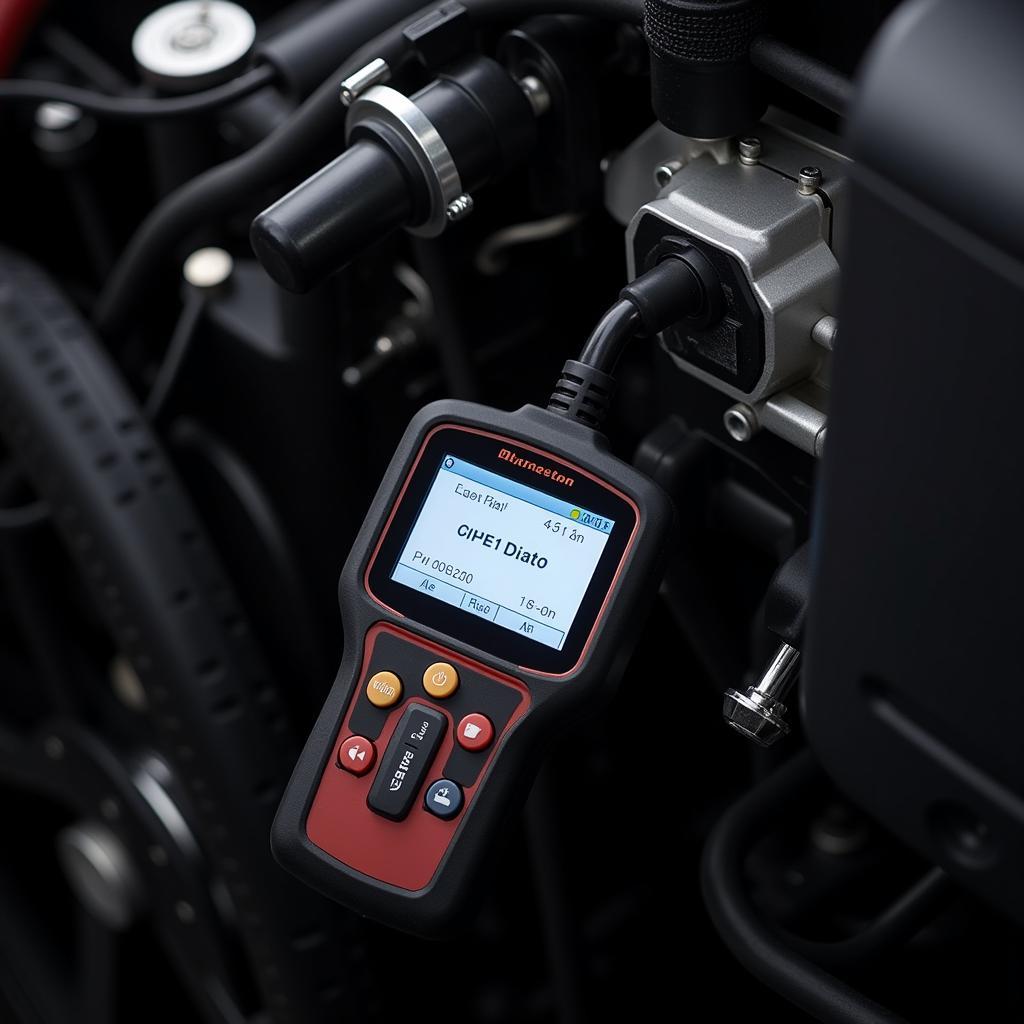OBD2, or On-Board Diagnostics, is a system found in most vehicles manufactured after 1996. It allows you to connect a scanner to your car and access valuable information about its engine and emissions systems. But when it comes to diesel vehicles, many drivers wonder, “Does OBD2 work on diesel?” The answer is a resounding yes!
OBD2 and Diesel Engines: A Perfect Match
While OBD2 was initially introduced for gasoline engines, it quickly expanded to encompass diesel vehicles as well. In fact, the environmental regulations placed on diesel engines prompted the need for a robust diagnostic system like OBD2.
 OBD2 Scanner Connected to a Diesel Engine
OBD2 Scanner Connected to a Diesel Engine
Here’s why OBD2 is crucial for diesel engines:
- Emissions Control: Diesel engines are known for producing higher levels of particulate matter and nitrogen oxides (NOx) compared to gasoline engines. OBD2 helps monitor and regulate these emissions, ensuring compliance with environmental standards.
- Engine Performance: Just like in gasoline engines, OBD2 monitors vital engine parameters in diesel engines, such as fuel pressure, injection timing, and exhaust gas recirculation (EGR) valve operation. This data is essential for diagnosing performance issues and maintaining optimal fuel efficiency.
- Diagnostic Capabilities: OBD2 provides a standardized platform for mechanics and car owners to access and interpret engine data. This simplifies the troubleshooting process, leading to faster and more accurate repairs.
Diesel-Specific OBD2 Codes
While OBD2 functions similarly in both gasoline and diesel vehicles, diesel engines have a unique set of diagnostic trouble codes (DTCs). These codes pinpoint specific issues within the diesel engine’s complex systems.
Here are a few examples of diesel-specific OBD2 codes:
- P0201 – P0212: These codes relate to injector circuit malfunctions, a common issue in diesel engines.
- P0401 – P0409: These codes indicate problems with the EGR system, which plays a critical role in reducing NOx emissions.
- P2002 – P2017: These codes point to issues with the diesel particulate filter (DPF), a component responsible for trapping soot particles from the exhaust gas.
OBD2 Scanners for Diesel Engines: Choosing the Right One
When selecting an OBD2 scanner for your diesel vehicle, it’s crucial to choose one that explicitly supports diesel diagnostics.
obd2 bluetooth tool with writing
Here’s what to consider:
- Diesel Compatibility: Ensure the scanner is designed to work with diesel engines and can read diesel-specific DTCs.
- Functionality: Basic scanners can read and clear codes, while more advanced models offer live data streaming, graphing capabilities, and specific tests for diesel components.
- User Interface: Choose a scanner with a user-friendly interface and clear, concise data presentation.
“Investing in a quality OBD2 scanner for your diesel vehicle is like having a personal mechanic on call 24/7,” says John Miller, a seasoned diesel mechanic with over 20 years of experience. “It empowers you to understand your engine’s health and address potential problems before they become major headaches.”
Conclusion
OBD2 is not just for gasoline engines; it’s an indispensable tool for diesel vehicle owners and mechanics alike. By providing insights into emissions, performance, and overall engine health, OBD2 ensures your diesel engine runs smoothly and efficiently for years to come. If you’re experiencing issues with your diesel vehicle, an OBD2 scanner is your first line of defense in diagnosing and resolving the problem.
